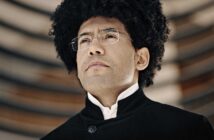Gunther Schuller: a Life in Pursuit of Music and Beauty
University of Rochester Press: Rochester, 2011
664 pages
In the fall of 1959, I made my third visit to New York City. I was an ambitious young bass player making a pilgrimage to the ‘Big Apple’ to play for one of the most respected of bass teachers anywhere at that time, Frederick Zimmermann of the New York Philharmonic. Fred and I got on very well and, in time, became the best of friends.
I remember vividly that when I saw him in 1959, Fred was consumed with excitement about a new work for four basses written by a man named Gunther Schuller. When I finally got to hear the piece, I too became excited about it and about its composer. The story of the Bass Quartet and Fred’s role in its gestation is told at length in this first volume of Schuller’s autobiography, in which, to my delight, he praises Fred as a man, a musician and a painter. Fred died of a brain tumor in 1969 shortly after retiring from the Philharmonic; although his life’s work has not yet been fully appreciated, Schuller, in this autobiography, has noted its importance.
Schuller the “Renaissance” Musician
At 85, Gunther Schuller looks back on a life of enormous accomplishments in many musical fields. He was appointed principal horn of the Cincinnati Symphony at age 17 and went on to spend 15 years as principal horn in the Metropolitan Opera Orchestra. At the same time, he was writing music and by the 1960s had become one of the leading composers of his generation.
Schuller has always had a strong interest in jazz and before long, he was collaborating with the likes of Miles Davis, John Lewis (of MJQ), Charles Mingus (one of Fred’s students, by the way), Bill Evans, Gil Evans and many others. He was one of the first composers to bridge the gap between classical and jazz music, and in so doing, was credited with spawning the movement known as “Third Stream.”
As though not busy enough, Schuller also found time to write books, including one on horn technique and two on the history of jazz. He also penned a massive analysis of hundreds of recordings of orchestral music under the title The Compleat Conductor. He founded his own record label, his own music publishing company, had a major career as a conductor and was head of music schools in both Boston and Tanglewood.
This autobiography by a multi-talented musician is a fascinating documentation of musical life in America from about 1945 to 1960. Schuller knew nearly everyone of importance in musical circles in those years and was talented and curious enough to digest everything that he saw and heard about the business.
Conductors: Up Close and Personal!
From his first chair position in the Met orchestra he saw many of the leading conductors of the period at their worst and at their best. He is able to confirm that Fritz Reiner, for example, was just as mean and nasty as his reputation suggests. On the other hand, he recalls a 1949 performance of Salome under Reiner, with Lubja Welitsch in the title role, as one of the greatest experiences of his life. Then there was George Szell, a conductor known to be just as mean-spirited as Reiner; for him, Schuller has nothing but contempt, and he never forgave Szell for his relentless efforts to humiliate him.
One of Schuller’s heroes is Maestro Dimitri Mitropoulos. Admittedly, his admiration of Mitropoulos is coloured by the conductor’s enthusiam for Schuller’s own music; nevertheless, the author’s defense of this immensely gifted musician, who deserved better than he got from the members of the Met orchestra and the New York Philharmonic, is commendable.
Schuller comes from a long line of musicians. His father, a violinist, played under Furtwängler in Germany and went on to become a member of the New York Philharmonic. Gunther was sent to study in Germany when he was very young and learned to speak German at an early age. Since it was the late 1930s he also fell under the control of the Nazis for a time, and was even forced to join the Hitlerjugend. He might have been trapped in Germany over the course of the war had it not been for a terrible accident, in which he lost an eye, prompting his mother to fly to Germany to bring him home.
From High School Drop-out to French Horn Vituoso
Schuller was virtually self-taught as a pianist, horn player and composer and in view of his illustrious career, it came as a shock to this reader to learn that he was a high school drop-out. Equally shocking was the revelation that after only a handful of lessons and a couple of years of practice on the french horn, he was playing this instrument, not only professionally, but at the highest level!
From High School Drop-out to French Horn Vituoso
Schuller was virtually self-taught as a pianist, horn player and composer and in view of his illustrious career, it came as a shock to this reader to learn that he was a high school drop-out. Equally shocking was the revelation that after only a handful of lessons and a couple of years of practice on the french horn, he was playing this instrument, not only professionally, but at the highest level!
What do I mean by “playing professionally at the highest level?” How about as a member of the NBC Symphony performing the Symphony No. 7 by Shostakovich in New York with Toscanini conducting!
In short, Gunther Schuller is a prodigious musical talent. In this autobiography, to be sure, he is not above boasting about his accomplishments or quoting from complimentary newspaper reviews – he is not a shy or modest man; on the other hand, there would be little point in writing an autobiography of more than 600 pages unless the subject were very special indeed. Credibly, an unusually shy or modest man would neither have had the opportunities afforded Schuller time and again, nor had the nerve to take advantage of them so effectively.
Details May be too Much of a Muchness for Some
Details May be too Much of a Muchness for Some
One of the potentially annoying features of Schuller’s book is his description of literally dozens of people as “close, personal friend(s).” How could one man have so many “close” friends? Well, he had an insatiable curiosity, and as noted, he wasn’t shy and he wasn’t modest. He wanted to know things and he often introduced himself to new people for that reason: i.e. they could answer his questions and satisfy his curiosity. Making friends is clearly another of Schuller’s great talents: he spent his afternoons playing the Ring cycle in piano four-hand arrangements with jazz pianist Bill Evans because Lewis could take him further into the world of jazz; he insisted on meeting Furtwängler in Berlin in 1953 because he admired the man and wanted to know what made him a great conductor.
For someone like myself who greatly admires Schuller and wants to know everything about his life, such a long book is not long enough; I can hardly wait for volume two. Many others, however, will find Schuller tedious and self-indulgent. They don’t need to know the name of every mountain in the Swiss Alps nor be taken on a Cook’s tour of Europe, nor do they need long lists of films that Schuller saw as a teenager, 20-year-old or 30-year-old.
Even Schuller’s admirers must wonder about the veracity of some of his claims. He often mis-spells names (e.g., film director Paul Czinner [p. 362], jazz player Gerry Mulligan [p. 497]), and some of his facts are demonstrably wrong (e.g., Karajan never recorded Ives Unanswered Question [p. 627], nor did he conduct an all-French program with the Vienna Symphony in 1953 [p.543]). Schuller prides himself on his sports knowledge but writes about “Bob” Boudreau when it should be “Lou” (p. 43).
On the basis of this volume, one must conclude that Schuller either has total recall of everything he has done throughout most of his life – every piece of music he has heard, every sideman on every jazz concert he has heard, and every word that he and his future wife said to each other when they were courting in their early 20s; he alludes to the separate diaries he and his wife kept, but even diaries don’t usually record the kind of detail he recalls throughout this autobiography.
Doubts aside, one cannot come away from this book without being utterly convinced that the greatest achievement of this gifted and ambitious man, was his marriage to Marjorie “Margie” Black.
Schuller first met Margie in Cincinnati when he was a member of the orchestra and she was a voice and piano student at the Cincinnati College of Music. They fell in love, lived together in New York, got married and had two sons. She died of cancer 20 years ago. The courtship is recounted in great detail but then Margie suddenly fades into the background. Perhaps she will rise to prominence again in volume two. In any case, there is no mistaking the depth of Schuller’s love for Margie, or how much he misses her. “I am very lonely…The void left by her disappearance from my life is at times not only unbearable but also incomprehensible (p. 569).”
A Life Lived to the Fullest Measure!
A Life Lived to the Fullest Measure!
Schuller presents his life story with unusual candor. He writes a good deal about his early years making it clear that he was a young man who wanted to experience everything life had to offer. He described himself as “an Epicurean, not only in matters of food and drink, but also in the whole range of human pleasures, from the intellectual to the sensual (p. 569).” When he toured with the Met he liked nothing better than to visit seedy night clubs and brothels. And later, accompanied by Margie, he loved to visit the fleshpots of Europe. Schuller is somewhat hyperbolic on the subject of sex but there is no mistaking its importance in his life.
Although love and sex often guided his thoughts and actions – a hyperactive libido is not uncommon amongst gifted musicians – they did not interfere with his career goals. Schuller worked extremely hard to improve himself as a musician, and while the book tells only the beginning of the story of Schuller the composer, educator and conductor, it tells us a great deal about Schuller as a young man and about the challenges of building a career in music during this period.
We learn that total commitment is required, a willingness to go anywhere anytime to work with older and wiser colleagues, a belief in oneself, and an understanding of what it means to be a professional musician – that is, showing up on time day after day, and being totally prepared for the job at hand. Music is an art form, but for a working professional it is also a job, which means that being ready and being punctual are almost as important as being talented.
Any young musician, no matter their instrument or career path, would do well to read Schuller’s A Life in Pursuit of Music and Beauty to understand the challenges that lie ahead and how to deal with them. Schuller’s The Compleat Conductor, is a must read for those considering a career in conducting.
Paul Robinson is the author of Herbert von Karajan: the Maestro as Superstar, and Sir Georg Solti: His Life and Music. For friends: The Art of the Conductor podcast, “Classical Airs.”
Photo: Gunther Schuller conducts in the Tanglewood Music Shed c. 1970s (Photographer Unknown, Courtesy BSO Archives)
Photo: Gunther Schuller conducts in the Tanglewood Music Shed c. 1970s (Photographer Unknown, Courtesy BSO Archives)
















